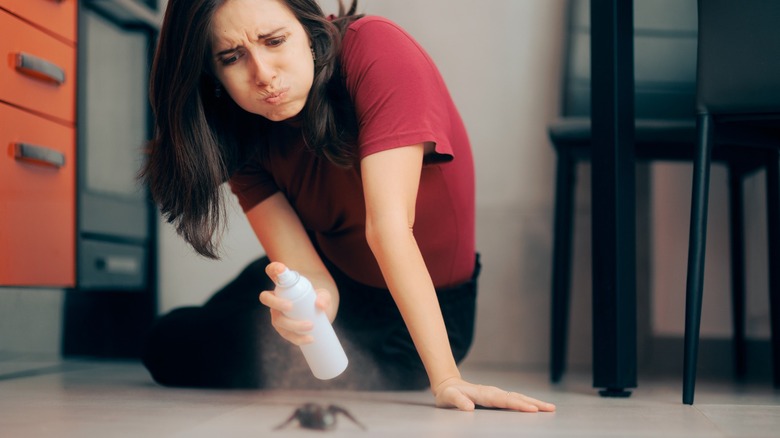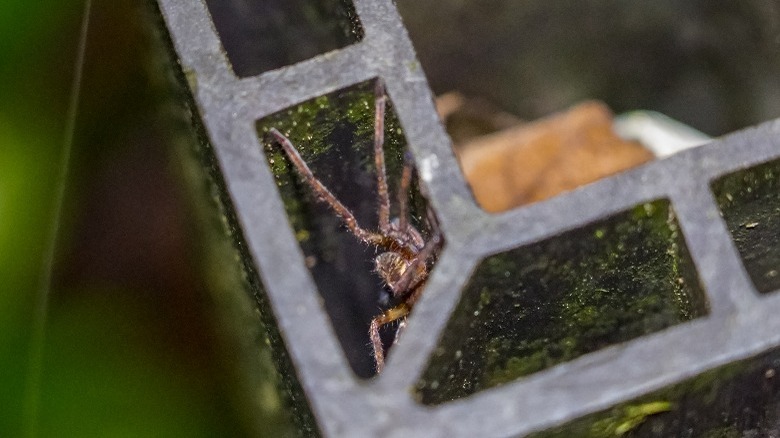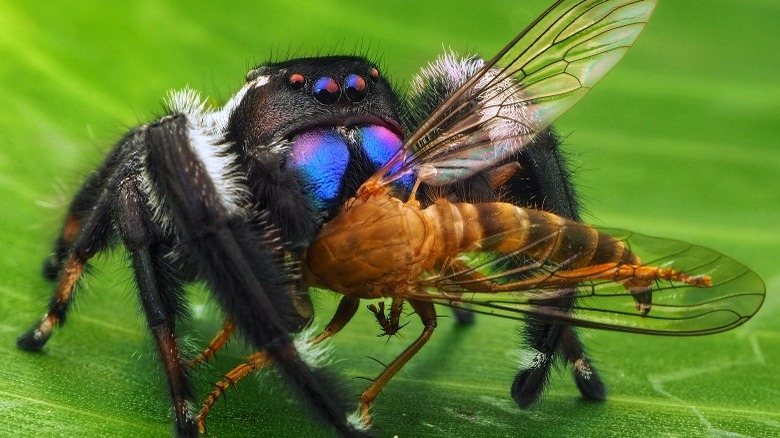Think Twice Before Using Commercial Insecticides To Get Rid Of Spiders
For many homeowners, seeing spiders lurking in their homes is enough to reach for an insecticide or call a pest control expert. Unfortunately, this measure frequently leads to disappointment when these eight-legged creatures reappear just a few weeks following the treatment. While it's understandable that you don't want them inside your house, many experts warn against killing spiders since most of them are harmless. In fact, they'll save you from the need to swat or spray other bugs.
But that isn't the only reason why you shouldn't use insecticides on spiders. First and foremost, insecticides are generally ineffective against spiders. Insecticides are formulated to kill insects and bugs, so while effective for most household bugs, like cockroaches, they aren't as effective in killing spiders, which are arachnids.
Secondly, commercial insecticides carry a degree of toxicity that can be harmful to humans, animals, and the environment. Many may lead to poisoning when inhaled, ingested, or coming into contact with skin. Pesticide exposure during pregnancy is associated with issues such as low birth weight and congenital defects. In children, such exposure can contribute to problems like learning difficulties and an increased risk of cancer, per the American Academy of Pediatrics. Notably, children are more susceptible to their adverse health effects.
Why insecticides don't work on spiders
Sam Yehia, owner of Sydney Best Pest Control, told The Sydney Morning Herald, "If you can't spray a spider, you can't kill it. When it comes to funnel webs, wolf spiders, or mouse spiders — ground spiders — you won't ever completely get rid of them with just spraying because they roam around hunting." While insecticides can kill spiders contacted directly by the spray, they're less likely to die from residual insecticides. Many spiders hide in secluded, hard-to-reach areas where insecticides are less likely to reach.
Unlike many insects that creep on surfaces, spiders' elongated legs elevate their bodies, minimizing direct contact with surfaces that might contain residual insecticides. Additionally, unlike with insects, any mouth contact for spiders is done with special appendages that never touch the surface, so there's little chance of ingesting residual insecticides in this way. However, spiders may rub against surfaces when they need to squeeze through cracks and gaps, so they may pick up insecticides on these surfaces. Spider eggs are also relatively impenetrable by pesticides.
Why you shouldn't use insecticides to kill spiders
Spiders are good for your yard. They kill the caterpillars that feast on your plants and the moths and flies that swarm your lamps. Spraying insecticides destroys the ecosystem and won't target just spiders, but will kill all insects. This is a problem, post-doctoral researcher Dr. Lizzie Lowe stated to The Sunday Morning Herald because "you want to have the good guys to help control the bad guys... so you don't have these massive outbreaks of creatures."
A 2015 study published in Functional Ecology also found that pesticides change the personality of spiders, making it harder for them to survive. Behavioral ecologist Jonathan Pruitt shared his worries with Science News Explores, saying that this "could result in even more insect pests and an even greater need for pesticides."
Instead of insecticides, you can ward off any unwelcome eight-legged visitors from your space by avoiding keeping stinky trash near the house, a big cleaning mistake that draws spiders to your home. You can also diffuse rose oil in your house, an essential oil spiders can't stand. Keeping your yard and house clean and changing your exterior lighting to fluorescent lights can also avoid attracting spider favorites like moths and mosquitoes into your home.


